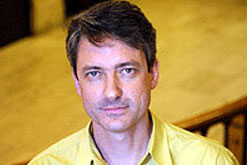The tyranny of the seemingly urgent: why the media neglects international development
George Monbiot – the environment commentator – wrote a recent cri de coeur on the failure of the media – by which I think he meant most mainstream outlets – to give sufficient coverage to climate change, despite the tumbling of global temperature records and accompanying floods and droughts that are hitting people all over the world.
He’s right of course.
It’s striking how little has been published or broadcast since last December’s United Nations Paris Climate summit agreed to limit temperature rise to 2 degrees.
Do editors think the pledges – and that’s all they were – made in Paris are the last word on climate change?
A recent conversation I had with a former colleague, and a respected environment journalist, suggests they may.
He lamented that he just couldn’t get climate stories on – even with the record temperatures and constant flow of natural disaster stories so-beloved of those same editors.
Surely giving climate change prominent coverage is in the public interest, I observed.
Unarguable you might think, whatever your views on the causes of rising global temperatures.
But then, it’s not just climate change where mainstream media journalists are failing the public.
There is also scant coverage of sustainable development.
As I wrote last year, when all UN member states came together in a historic agreement on the Sustainable Development Goals that aim to produce a fairer world which actually has a long-term future, there was barely a peep of interest.
And things haven’t changed since then.
The first high level meeting to review progress towards the SDGs a couple of weeks ago, where 22 countries reported what they have done and plan to do, was largely ignored by the media.
If you do an internet search you’ll find stories on specialist development blogs and a few niche business news sites, but little else.
The only mainstream media outlet I could find that published anything was The Guardian, which actually has a development sub-index on its website. Although, even that merits only a qualified welcome given the Guardian gets the Gates Foundation to subsidise this coverage, suggesting even the editors there still don’t see development as deserving of much coverage purely on its own merits.
So why are journalists largely ignoring sustainable development?
Well, partly it’s because they are subject to the tyranny of the urgent over the important – there always seems to be something more immediate they judge needs reporting.
But they also fail to see development as a story because they’re prone to what I’d call a tramline mentality. There are certain kinds of stories they’re used to covering – be it political rows, terrorist attacks, natural disasters, or even changes in interest rates – and they think they know how to cover them.
It means they stay in their comfort zone, but it’s a failure journalistic imagination.
How to break out of this compartmentalised thinking?
One way may be to create new indices on websites and in papers to encourage journalists to see the importance of sustainable development stories.
Many papers and news sites already have “environment” pages or indices – which is not just a way to help users navigate stories, but also, I’d argue, a reflection of how journalists categorise stories in their own minds.
So one suggestion I’ve heard – and will repeat here – is to rename those indices “people and planet”.This may help editors and reporters to think about environment and development, and their impact on people’s lives – the all-important human interest angle – as deeply entwined and interrelated.
Then there is the public interest argument.
What could be more important than the future of the planet we all depend on for our very existence?
Yet, many of the editors who respond to criticism of their coverage of the foibles – and worse – of politicians by citing the public interest (even when the scale of that coverage risks turning the public off) are the same ones who routinely ignore or underplay sustainable development.
If editors don’t see coverage of such existential matters as in the public interest, there is a more mundane, but perhaps more familiar, reason for covering the issue.
That old hoary chestnut “the way taxpayers’ money is spent”.
There has been a lot of media scrutiny over the past year in the UK of the foreign aid budget, including from outlets which, shall we say, are not well-known for their international coverage.
So there is already an appetite for covering development aid.
It’s also becoming clear that from now on much of that aid is going to be prioritised according to the commitments made in Sustainable Development Goals.
So, with a bit of joining up of the dots, there may be hope that editors, who up to now have had little interest in covering the SDGs and international development, could be persuaded that there are good reasons for changing their approach.

